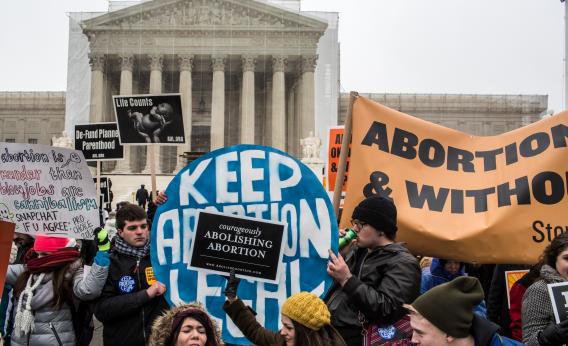Earlier this week, New Mexico state representative Cathrynn Brown grabbed a few headlines by introducing a bill that appeared to be aimed at jailing rape victims who abort their pregnancies for “tampering with evidence.” After all the negative attention, the bill has been tweaked to exempt rape victims from prosecution, but the language still leaves wide open the possibility that abortion providers and anyone who might help pay for abortions could be investigated for attempts to destroy “evidence” of rape. It’s not likely that Rep. Brown—who is fond of goofy bills, like one that would create a registry for drug offenders similar to the sex offender registry—will get far with this bill in the Democratic-controlled state, making this one of those “look at the crazy right wing nut!” stories that’s destined to sink under the waves rapidly.
Still, we should look at the crazy right wing nut because it’s worth considering the context for a bill that, at a time when rape exceptions are not a given in the GOP, is clearly meant to put more obstacles between rape victims and abortion. New Mexico, like many heavily rural states, has very few abortion providers, but the state’s Southwestern Women’s Options is actually one of the very few clinics in the country that offers abortions up to 28 weeks. Indeed, two of the doctors that work there are two of the remaining four doctors in the country who do these very late term abortions after the murder of Dr. George Tiller. Most women get abortions in the first trimester or early in the second. The patients that come in for very late-term procedures tend to be in much more desperate situations. In their documentary After Tiller, about the New Mexico clinic, filmmakers Lana Wilson and Martha Shane describe these patients:
Sometimes it’s a young woman who didn’t know that she was pregnant, didn’t recognize the signs. Sometimes it’s, you know, a rape victim who’s in denial about what happened to her. So, it’s a range of reasons, but these are really the most desperate situations.
That rape victims tend to abort later in their pregnancies is a common observation from abortion providers, and the statistics back it up. According to research published in the Journal of the American Medical Association, a third of pregnant rape victims don’t even discover their pregnancy until the second trimester. Guttmacher research found that women getting later term abortions were significantly more likely to have suffered rape or domestic violence. The reality is that clinics like Southwestern Women’s Options that provide later abortions are dealing with a lot of patients who are suffering from sexual coercion or abuse, and often at shockingly young ages.
New Mexico has a sexual assault problem, with rape rates rising recently (one in four women in the state reports having been raped). It’s in this context that Rep. Brown thought it would be a grand idea to make it harder for abortion providers to help rape victims, even though New Mexico has one of the few in the country that can help victims late in their pregnancies. It’s possible that Rep. Brown is unaware that New Mexico has a clinic that serves rape victims who often have to travel far to get help. It’s also possible that she knows.
